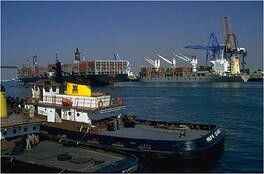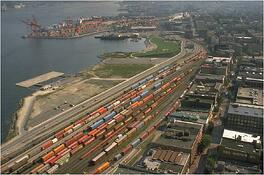The Federal Maritime Commission issued a Notice of Inquiry “to solicit the public’s views and information concerning factors that may cause or contribute to the shift of containerized cargo destined for U.S. inland points from U.S. to Canadian and Mexican seaports.”
In other words, a cry for help was sounded.
It seems elected government officials are concerned about the trend of more and more U.S. imports entering North America through ports in Canada and Mexico instead of ports in the United States.
It’s about time. They should be concerned.
U.S. ports have been losing their competitive edge. Why? Because of an ad valorem Harbor Maintenance Tax (HMT).
For those of you not down with Latin, ad valorem means according to value. A 0.04% HMT on the value of imported and exported cargo was introduced as part of the Comprehensive Water Resources Development Act of 1986. In 1990, Congress more than tripled the tax to 0.125% ad valorem.
The point of the HMT was to create a Harbor Maintenance Trust Fund (HMTF) to pay part of the maintenance and navigation channel improvement of the nation’s port system, including the very important dredging of the channels and rivers. Before 1986, the federal government was responsible for paying for all of this.
 Healthy, competitive ports are extremely important to our nation’s economy.
Healthy, competitive ports are extremely important to our nation’s economy.
The HMT was applied across the board to all the ports in the U.S. so they would remain competitive. But I guess the fact that these taxes or fees wouldn’t have to be paid on cargo entering through ports of our neighboring countries wasn’t considered.
To circumvent the HMT, cargo headed for the U.S. has come in through the ports of Mexico and Canada. Why pay more to import through U.S. ports?
According to a Jean C. Godwin speech given at the 31st Transportation Law Institute, “The HMT ultimately added hundreds of dollars to the cost of shipping a single container of high value cargo, and has caused traffic to be diverted to non-U.S. ports to avoid payment. The imposition of the HMT caused a rail-barge service on the Great Lakes to go out of business.”
Big deal. What’s a rail-barge service? Jobs, that’s what. And in the Great Lakes region! What’s the Great Lakes State? Michigan. The state’s economic woes are well known between Detroit’s reputation and the featuring of Flint in Michael Moore films. Aren’t the good people of Michigan sitting in hard enough times without losing more jobs from their region?
But of course, U.S. imports and exports affect every state in the country. As Godwin’s speech was given in 1998, how likely do you think it is the HMT has cost more people their jobs than just those working at that rail-barge service?
The U.S. economy has been crying for help for a while. Recession, home foreclosures, unemployment, and the like have citizens sick with anger and speaking out. It’s about time we hear government officials calling for help on what to do about our ports which are key to economic health.
This is not a time to allow U.S. ports to continue becoming less and less competitive.
In 1998, the Supreme Court ruled the HMT to be unconstitutional for exports. How much longer can this tax on imports be allowed to stay as is?
The HMT is hurting the competitiveness of our ports and instead of using the money in the HMTF to perform all the dredging that should be done to allow ships better, safer transits with fuller loads to make the U.S. more competitive in the global market, most of the money is being left in the fund as “excess” to make the federal deficit appear to be smaller than it actually is.
HMTF to perform all the dredging that should be done to allow ships better, safer transits with fuller loads to make the U.S. more competitive in the global market, most of the money is being left in the fund as “excess” to make the federal deficit appear to be smaller than it actually is.
Responses to The Federal Maritime Commission’s Notice of Inquiry are due today. But there’s no time limit on sharing your views with the world by commenting below.
What do you think the result will be if U.S. ports continue this trend of becoming less competitive? What are ways we can increase competitiveness of U.S. ports and energize our economy?
